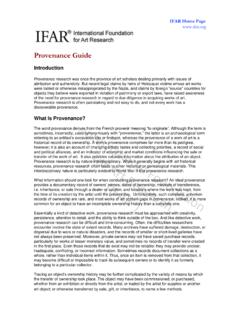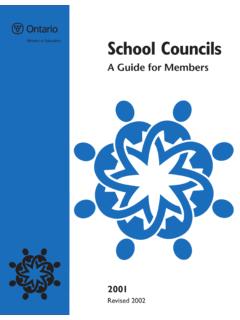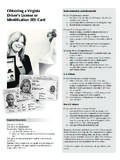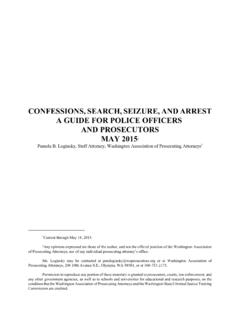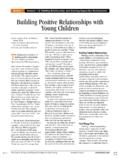Transcription of Personal Assessment Coaching Guide
1 Personal Assessment Coaching Guide Center for the Army Profession and Leadership Fort Leavenworth KS October 2020 i Table of Contents Document Overview .. 1 PART 1: THE ROLE OF THE COACH .. 2 Coaching .. 2 Coaching 2 What Coaching Is and Is Not .. 3 Coach Presence .. 4 Communication .. 4 Speech Acts .. 6 Personal Awareness .. 6 Coaching Competencies and Activities .. 8 Coaching Competencies .. 8 Coaching Activities .. 9 Activity 1: Building Rapport .. 9 Activity 2: Gathering Information .. 10 Activity 3: Analyzing Data .. 10 Activity 4: Addressing Gaps .. 11 Activity 5: Narrowing the Focus .. 11 Activity 6: Setting Goals .. 12 Activity 7: Planning Development .. 12 Activity 8: Promoting Action .. 13 Criteria for Selecting Questions .. 14 PART 2: CONDUCT A Coaching SESSION .. 15 Preparing for a Coaching Session .. 15 Coaching Environment and Focus .. 15 Ethical Responsibilities.
2 15 How to Analyze a Feedback Report .. 17 Individual Development Plan .. 17 The IDP Form .. 17 The IDP Process .. 18 Standardized Coaching Sequence .. 22 ii APPENDIX A Coaching COMPETENCIES .. 24 Setting the Foundation .. 24 Meeting Ethical and Professional Standards .. 24 Establishing the Coaching Agreement .. 25 Co-Creating the Relationship .. 25 Establishing Trust with the Leader .. 25 Coaching Presence .. 26 Communicating Effectively .. 27 Active Listening .. 27 Powerful Questioning .. 28 Direct Communication .. 29 Facilitating Learning and Results .. 30 Creating Awareness .. 30 Designing Actions .. 31 Planning and Goal Setting .. 31 Managing Progress and Accountability .. 33 APPENDIX B DISCUSSION QUESTIONS FOR EACH Coaching ACTIVITY .. 34 APPENDIX C GUIDELINES FOR PLANNING DEVELOPMENT .. 36 For further information or to submit comments on this Guide , contact the Center for the Army Profession and Leadership Document Overview The purpose of this Guide is to support Coaching to Army leaders.
3 Developing others is a requirement of all leaders. Coaching is one way to engage in developing others. It is similar to counseling and mentoring. Coaching aims to bring out and enhance capabilities already present in a leader. Part 1 of this Guide describes the role coaches fulfill and what coaches must know prior to Coaching leaders. The sections provide prospective coaches with basic knowledge and awareness to assume the role of coach. Part 1 includes a description of what Coaching is and is not and the fundamental considerations of Coaching . Part 1 then focuses on the eight activities of the Coaching process, which are based on coach competencies and techniques developed by the International Coach Federation (ICF). Each role and function is followed by sample questions that a coach can ask a leader during different phases of Coaching . Part 2 of this Guide provides information on what coaches must do when Coaching leaders.
4 This describes how to conduct a Coaching session. This procedural framework includes sections on the preparation required prior to a Coaching session, the interpretation of feedback reports, and the development of an Individual Development Plan (IDP). Appendices provide information on the competencies of coaches, questions to use during Coaching , and guidelines to help plan individual development. 2 PART 1: THE ROLE OF THE COACH Coaching When Coaching follows individual assessments, the desired result links feedback interpretation with developmental planning. Coaches can come from different relationships: those who are familiar and those who are provided by the organization to help individuals and teams improve. The role of coaches involves helping leaders understand and appreciate their current level of ability and potential and Guide the leader to choose ways to get better.
5 When Coaching is part of a program of individual assessments, coaches help explain the Assessment results, Guide the identification of strengths and developmental needs, provide insight or suggestions on how to build on knowledge and skill, and Guide a leader through the creation of an action plan or development plan. Coaches help leaders gain insight that can have an immediate effect on how the leader can improve their choices and behaviors. Coaching is an organic part of many Army positions, including professors of military science, instructors, faculty, trainers, observer/controllers, raters, senior raters, and battle buddies. Those positions that are not in the leader s chain of command are in a unique position to provide Coaching to Army leaders, as they can approach each feedback session with objectivity as they help leaders interpret and understand feedback.
6 As faculty and trainers already engage in the leader development of students through academic counseling, they are well suited to provide Coaching . Coaching is a normal and routine part of responsibilities and workload. Applying the guidelines in this document will enhance and expand the leader development process that already occurs. When an Assessment and feedback program is executed for developmental purposes, confidentiality is of great importance. Under this condition, a leader who participates in assessments has full discretion as to who views their feedback report. Thus, if a faculty or unit member is approached by a leader for Coaching , the leader has already shown some degree of trust and confidence in that person to discuss professional information. Therefore, coaches must demonstrate the highest ethics and maintain confidentiality of the entire process for the benefit of the assessed leader.
7 Coaching Fundamentals Prior to engaging in a Coaching session, personnel must have a base of knowledge on the practice of Coaching . The following sections provide descriptions and definitions of the role coaches play in the process. This section includes: Five Fundamental Considerations of Coaching . Eleven Coach Competencies. Eight Activities of a Coaching Interaction. The five fundamental considerations of Coaching provide a basis for understanding the nature of Coaching interactions. The coach competencies describe the knowledge, skills, and abilities coaches bring to the interaction. The Coaching activities provide general descriptions of how coaches interact with leaders, sample questions to raise during the process, and indicators of effective Coaching for each activity. 3 What Coaching Is and Is Not It is important to highlight the differences between Coaching and other forms of leader interaction such as counseling, instructing, and mentoring.
8 The chart below provides a definition for each practice, the focus of the interaction, and what you provide to the recipient from the interaction. Practice Definition Focus What You Bring Coaching A customized development process with an individual that uses observable data, provocative questions, coach expertise, and a safe, supportive, partnering relationship to Guide a leader in creating solutions and development paths forward. Supporting the leader in developing solutions and strategies on their own. Development of competencies and capacities for forward movement and/or improvement. Supporting the leader in putting ideas and awareness into practical application on the job. Balancing individual and organizational goals. A safe partnering relationship. Genuine interest in the leader s development and success. Provocative questions and strong listening skills.
9 Willingness and ability to understand the leader s unique situation. The ability to get out of the way of the leader s process to enable him or her to come up with their own solutions and strategies for success. Developmental Counseling The process used by leaders to review with a subordinate the subordinate s demonstrated performance and potential (ADP 6-22). Driven by a specific event, to review performance, or for professional growth. Specific feedback is provided which leads to directed or joint establishment of performance objectives and standards. Emphasis on subordinate development. A clearly defined purpose for the counseling. Right balance of support and challenge to encourage the subordinate while providing guidance when working on problematic issues. Flexibility in counseling style to fit the subordinate. Interest in the subordinate s success. Instructing or Teaching A process in which individuals with specific content expertise educate others by providing knowledge and materials relative to the content.
10 Transferring knowledge or technical understanding from an expert to a learner. Sharing information in a way that accurately captures what the learner needs to know. Thorough knowledge of the content to be taught. Ability to present information in a readily understandable manner. Appropriate environment for transfer of knowledge (classroom), one-on-one interaction, demonstration, etc. Mentoring The voluntary developmental relationship that exists between a person of greater experience and a person of lesser experience that is characterized by mutual trust and respect (AR 600-100). Development of a career path or particular skill set. Building a relationship in which the mentor is invested in the progress and success of the mentee. Supporting the organization and advancing individual and professional goals. Experience in a relevant area. Willingness to dedicate time and energy.



